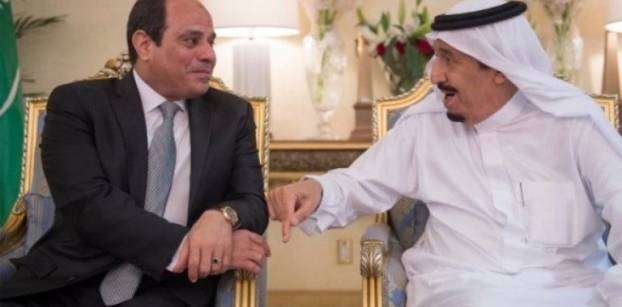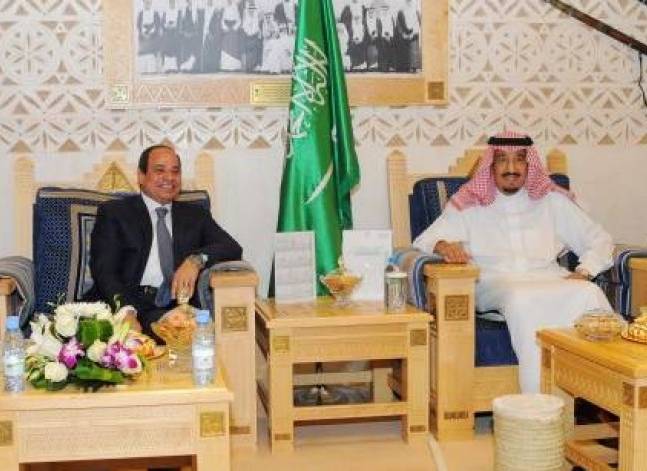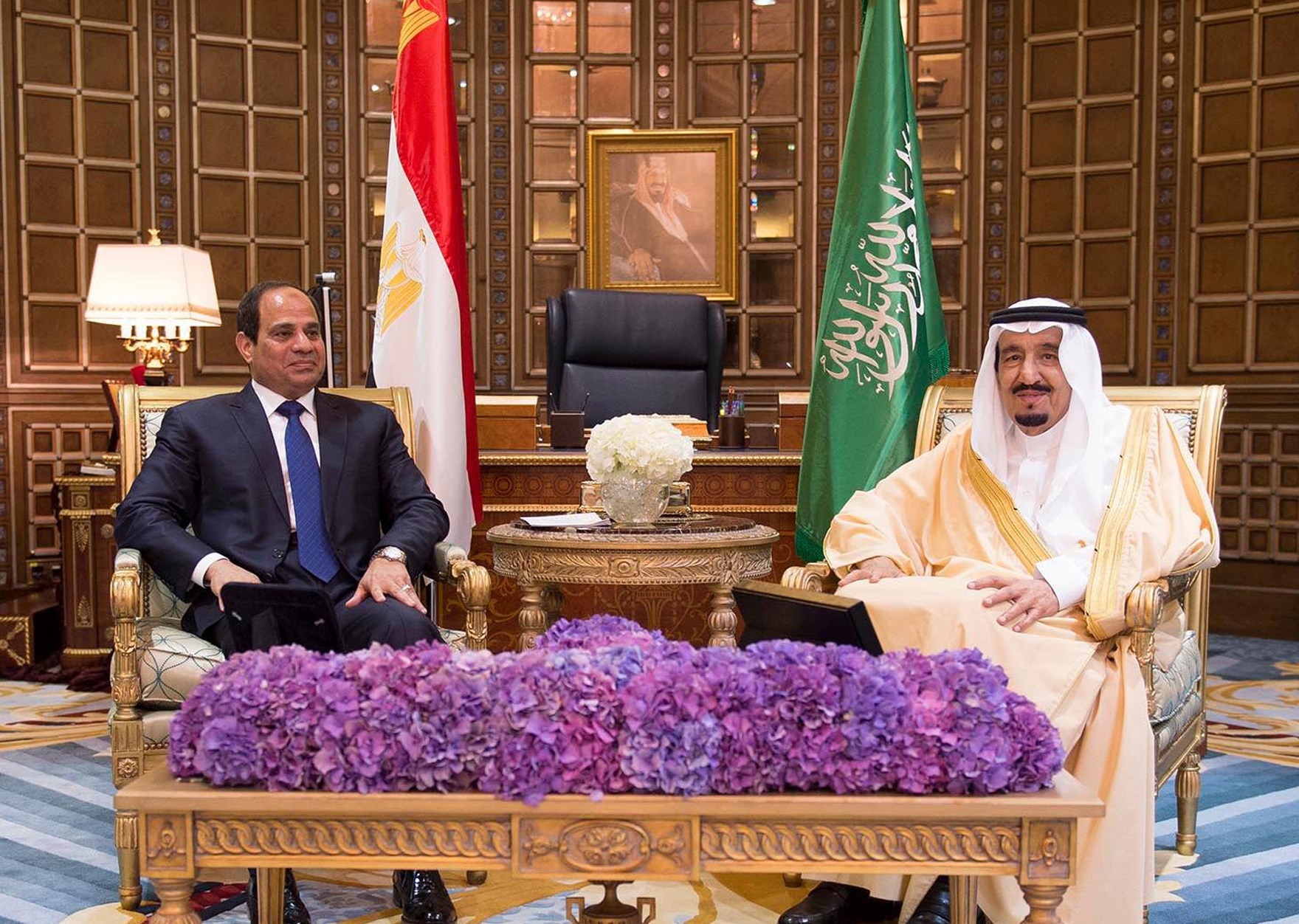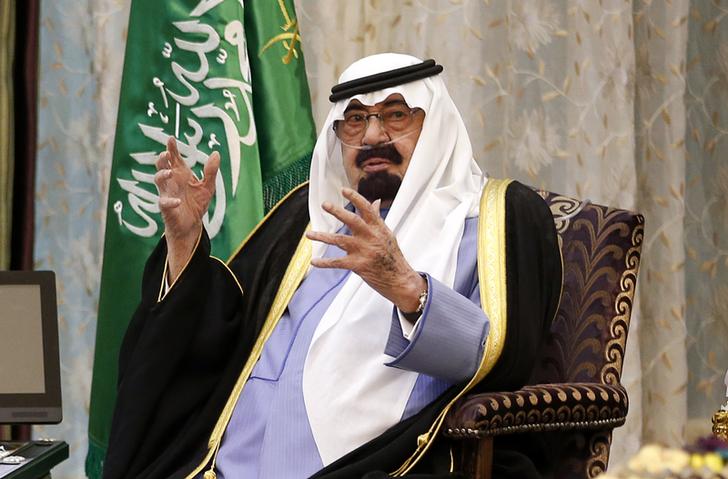Latest NEWS
- Aswat Masriya, the last word
- Roundup of Egypt's press headlines on March 15, 2017
- Roundup of Egypt's press headlines on March 14, 2017
- Former Egyptian President Hosni Mubarak to be released: lawyer
- Roundup of Egypt's press headlines on March 13, 2017
- Egypt's capital set to grow by half a million in 2017
- Egypt's wheat reserves to double with start of harvest -supply min
- Roundup of Egypt's press headlines on March 12, 2017
Saudi king sets aside frustrations with Egypt for state visit
President Abdel Fattah al-Sisi and Saudi King Salman in Hafr Al-Batin March 10 in 2016 - Saudi Press Agency.
RIYADH/CAIRO (Reuters) - Despite years of mutual frustration and disappointment over diverging priorities, Saudi Arabia and Egypt remain fundamental to each other's security, a message King Salman's visit to Cairo this week is intended to reinforce.
The rare foreign trip by the 80-year-old Saudi ruler will counter media commentary in both countries of discord between the richest Arab state and the most populous, to show Riyadh still backs Egyptian President Abdel Fattah al-Sisi.
Gulf monarchies have lavished aid on Egypt since 2013, but have grown increasingly disillusioned at what they see as Sisi's inability to address entrenched corruption and inefficiency in the economy, and at Cairo's reduced role on the regional stage.
However, with Iraq, Syria and Yemen immersed in civil war, and Saudi Arabia preoccupied by its own region-wide tussle with Iran, Riyadh is determined to stop the Egyptian state from failing. It will maintain some aid despite its own tighter budgets from falling global oil prices, analysts say.
That position contrasts with Riyadh's approach to Lebanon, from which Gulf states have pulled aid in response to the growing role there of Iran's ally Hezbollah, evidence of Saudi Arabia's with-us-or-against-us regional doctrine.
"The Saudis are very keen not to allow Egypt to collapse, but at the same time the Saudis cannot pay forever. I think King Salman will try to explain these issues," said Mustafa Alani, a security analyst with close ties to the kingdom's Interior Ministry.
In recent months, groups of Egyptian ministers have flown to Riyadh almost weekly for meetings with their Saudi counterparts, a diplomat said, and officials are planning to unveil Saudi investments of $4 billion this week.
Saudi Arabia is also expected to sign a $20 billion deal to finance Egypt's petroleum needs for the next five years and a $1.5 billion deal to develop its Sinai region, two Egyptian government sources told Reuters.
Egyptian intelligence sources said Sisi wanted the visit to soothe the recent strains in the relationship, attract more Saudi investment, reassure Riyadh over Cairo's support for its stance towards Iran and discuss possible arms deals.
Agreements to cooperate more closely on a range of issues, from the armed forces to the economy, will be announced, say people in Riyadh, but are seen as unlikely to make the relationship significantly deeper.
"It is like a married couple who argue but decide to stay together for the sake of the children," said Jamal Khashoggi, a prominent Saudi journalist.
Disappointment
Once a central axis of Middle East politics, the relationship between Cairo and Riyadh has become increasingly peripheral since the 2011 Arab uprisings in a region now beset by civil wars and widespread unrest elsewhere.
In Syria, where Saudi Arabia is a leading backer of rebels, it has worked most closely with Qatar and Turkey, political rivals of Egypt. In Yemen, Cairo has contributed naval forces to a Saudi-led military intervention, but Riyadh's main ally has been the United Arab Emirates.
Riyadh was a strong supporter of Sisi's rise to power as army chief in 2013 and president the following year, after his military overthrew a Muslim Brotherhood-led government that emerged from the revolution.
While Saudi Arabia views Iran as its most pressing regional adversary, it also sees Sunni Muslim Islamist movements like the Muslim Brotherhood ultimately posing a greater threat to its dynastic system of rule and fears their rise in Arab allies.
However, as Saudi Arabia has turned to confront what it sees as a threat of Iranian expansionism across the region, Egypt has grown ever more introverted, focusing on the turbulent aftermath of its uprising and counter revolution.
Riyadh wanted Cairo to play a central role in its coalition confronting Yemen's Houthi group, which the kingdom says is allied to Iran. Egypt was reluctant to commit ground troops.
Western diplomats in Cairo and the Gulf said this strained ties somewhat, but that Riyadh had ultimately accepted Egypt's reasoning and its public pronouncements that it would defend Saudi Arabia from any external threat.
"The fact is that because of its revolution and its domestic economic situation, Egypt is not what it was, and more and more the Saudis are taking this prominent role," said a diplomat. "The Saudis have some differences with them, but it's between consenting adults."
Still, Egypt's naval participation in the Yemen campaign is seen in Riyadh as important and despite Cairo's unwillingness to join Gulf states in declaring Hezbollah a terrorist group, its regional position has broadly aligned with that of the kingdom.
Lavish aid
Both Egyptian Foreign Minister Sameh Shukri and Saudi Foreign Minister Adel al-Jubeir dismiss any talk of recent strains, insisting there was no ill feeling over the Yemen campaign or other issues.
"This is an historic visit," said Jubeir at a news conference on Tuesday. Shukri, in an interview with the pro-government daily al-Youm al-Sabee last week, he and Jubeir were "amazed" at suggestions the relationship was difficult.
Since Egypt's army deposed the Islamist government in 2013, Saudi Arabia, the UAE and Kuwait have given Cairo around $35 billion in aid in the form of oil shipments, cash grants and deposits into the central bank.
Meanwhile, Riyadh and Cairo have spoken of the need to increase Gulf investments into Egypt, a goal that has faltered as prominent businessmen in Saudi Arabia and its neighbours have complained openly about red tape and corruption.
For some in Riyadh's elite, the fault lies with Egypt's president, a man regarded when the army seized power from the Muslim Brotherhood in 2013, and upon his election in 2014, as Saudi Arabia's newest best friend.
"Sisi enjoyed the position of a hero at that time. He was the guy to fix Egypt and save it from chaos. Now in the same majlises [salons] in Riyadh, he's lost that appeal," said Khashoggi.
(Additional reporting by Michael Georgy in Cairo and Sami Aboudi in Dubai)














